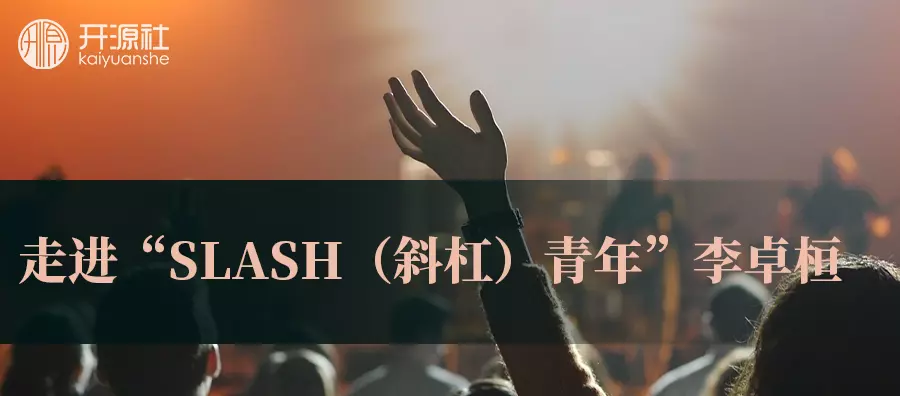The term “SLASH youth” has become popular in recent years. It describes people who refuse a single professional label and instead choose a multi-hyphenate life with multiple vocations and identities.
In this interview, we meet such a “SLASH” youth: Huan Li (李卓桓). He wears many hats—entrepreneur, investor, author, programmer, advisor, and extreme-sports enthusiast. Here he shares stories from his journey and his deep connection with open source.
1. Resume: Refusing to be pigeonholed
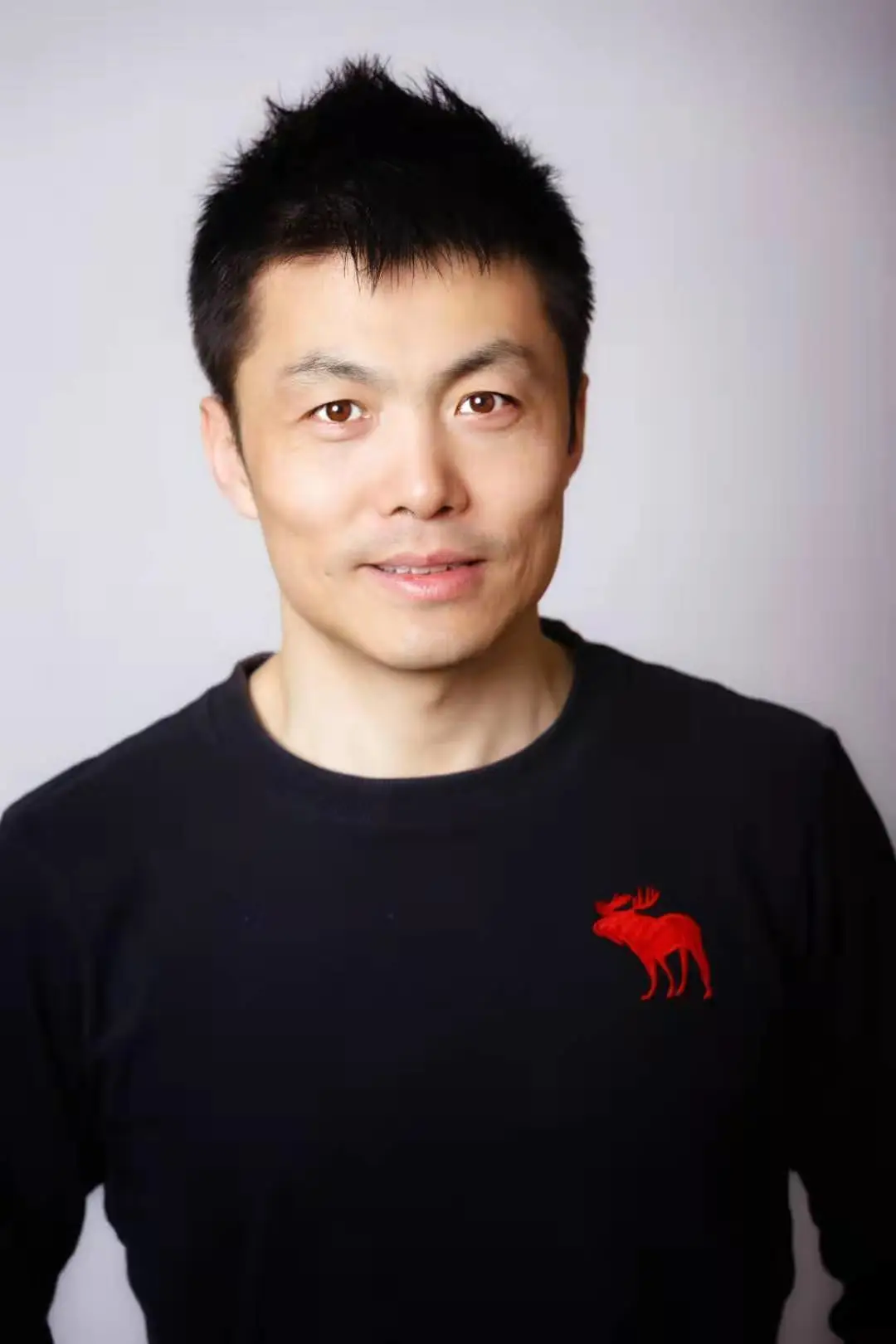
https://blog.zixia.net/2007/06/28/computer-with-huan-preface/
LinkedIn: https://www.linkedin.com/in/zixia/
With 25 years of programming and 15 years of Internet entrepreneurship behind him, Huan has invested in 100+ mobile Internet startups. In this not-so-small community, persistent effort has made him a standout.
In his words, he’s “someone who fell in love with computers as a kid and pursued a life of writing code.”
He has served as the administrator of the Tsinghua University BBS “ShuiMu Tsinghua,” founder of Jiwai, and Chief Scientist of Youku. He’s now a partner at PreAngel, a Venture Partner at Plug and Play, and co‑founder of Venture SPRINT.
He’s also an active angel investor and an LP in multiple angel funds in China and the U.S., with a portfolio focused on artificial intelligence and machine learning.
His industry roles include Vice President of the Zhongguancun Equity Investment Association; founding council member of the China Angel Union; Chair of the TEEC (Tsinghua Entrepreneur & Executive Club) AI Committee; and advisor to multiple startups and VC firms.
2. Entrepreneurship: A challenge of thinking
In this interview, Huan reflects on his entrepreneurial journey:
- During university, he worked at ChinaRen—one of the brightest stars in the 1999 Chinese Internet scene—handling server setup, system administration, operations, sitewide log collection/analytics, charting systems, and more.
- Later in college he founded AKA Information Technology, delivering Internet services entirely on open source software: the wMail email system; wForum (ShuiMu Tsinghua BBS web system); AKA SMSD (a mobile SMS platform that bridged BBS and SMS); and an anti‑spam email gateway. He still archives that code on GitHub (https://github.com/zixia).
- In 2005, he co‑founded Youku. With a founding team of under ten people, he built the product and engineering team from scratch and delivered the first version of the site to production.
- In 2007, he founded Jiwai—China’s early Twitter‑like microblogging service—which closed in 2009.
These experiences made him more rational about the relationship between entrepreneurship and “having a job.”
The “employee mindset” often optimizes for “fewer hassles,” getting tasks to a passable 60/100.
The “founder mindset” is different. It asks: Is there a better way to meet this need? Why do we need this at all? Is there a different approach that addresses the real problem more effectively?
In software terms, with TDD: the employee mindset stops when the code passes unit tests; the founder mindset reads tests to understand system design and behavior—and even suggests improving the tests.
3. Open source: When the hero finds the right blade
Huan has practiced open source in many forms—and leads by doing.
In the past three years, he’s committed 30,000+ lines of code to GitHub and published dozens of open repositories: 10+ npm modules, 5 PyPI packages, 5 Docker images, a Swift module, and more.
He has contributed patches upstream that were merged by many projects, including Microsoft’s Bot Framework and Google’s TensorFlow.
Collectively, his projects have amassed 10,000+ GitHub stars and thousands of downstream dependents; his modules see ~30,000 monthly downloads, and his Docker images have been pulled over a million times.
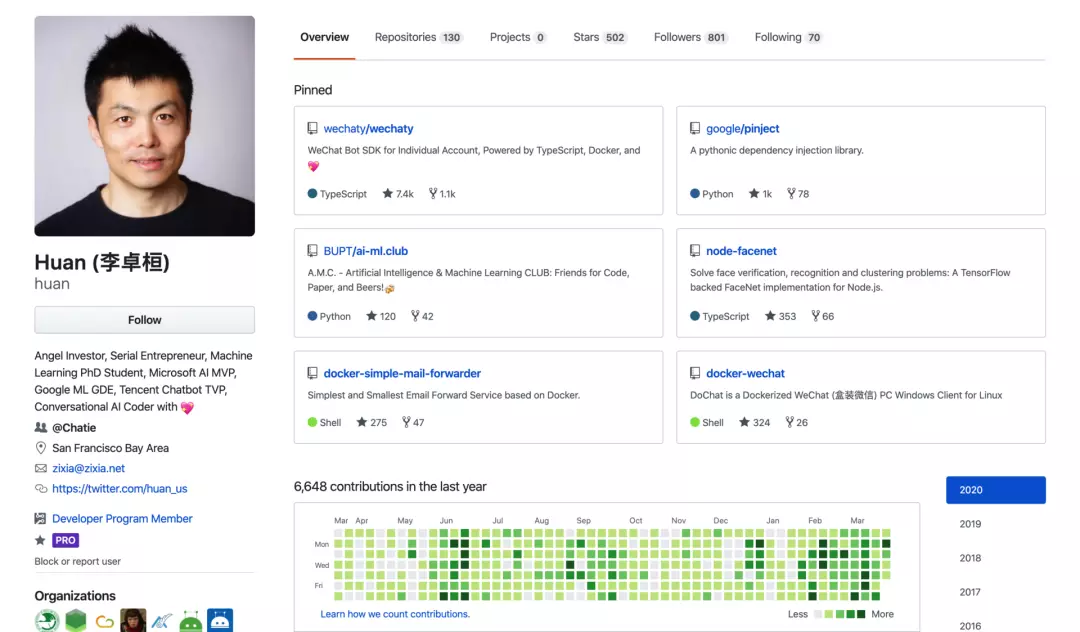
He’s been invited to serve as owner/maintainer for multiple open‑source organizations and projects: an owner of the Level (LevelDB) org, maintainer for Google’s pinject, maintainer for Node‑Python bridge projects, and more.
Within Kaiyuanshe (开源社), he serves as a committer to OSSChat, a project co‑initiated by the Apache Software Foundation and Kaiyuanshe.
Why open source? For him, it began as a pure hobby.
“I’ve always loved code. That love helps me see open source’s importance to software, and the power of open communities. For developers, the best way to learn is to use mature code and build upon it. In a closed world, the developer community would grow at least an order of magnitude slower than in the open world.”
He encountered GNU/Linux and open‑source culture after arriving at Tsinghua in 1997 and joined an online group promoting GNU/Linux called AKA Information Technology.
Site: http://www.aka.net.cn (2003)
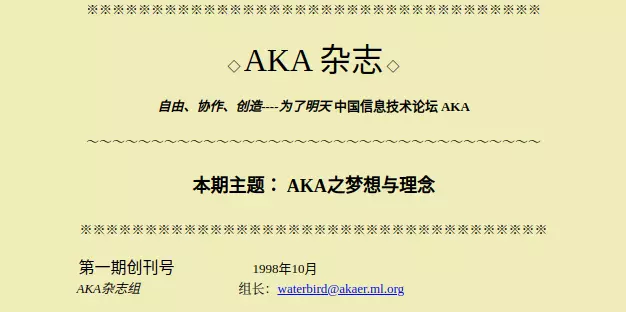
The first issue of AKA’s magazine (Oct 1998): http://www.aka.net.cn/Magazine/Aka1/aka1-cover.html
Possibly the earliest Chinese translation of “The Cathedral and the Bazaar”: http://www.aka.net.cn/Magazine/Aka1/c&b.html
“Since then, GNU/Linux has been central to my study and work, and the open‑source ethos took root in my heart.”
4. Insight: Open source as a way to solve problems
Two favorite quotes:
“When we speak of free software, we are referring to freedom, not price.”
— Richard M. Stallman“Software is like sex: it’s better when it’s free.”
— Linus Torvalds
Huan sees “Free” in two layers: freedom and free‑of‑charge. Together, they describe a community of hackers who pursue freedom, give knowledge freely, and move that knowledge forward in the form of software—making life better.
His definition: Hackers are people with the ability and the will to change the world, who keep sharpening their craft to make the world better. Many open‑source authors and contributors are hackers by this spirit.
On open source’s societal value:
Open source lowers the barriers to knowledge flow, accelerating meaningful innovation. Early Linux was a student‑level project. But as GNU/Linux spread, new generations embraced open source, and—through the GPL—kept iterating Linux. The starting point may be low, and progress daily, but compounding is powerful.
“If Linux started at 1/100 (with Windows at 100), and the community improves it 1% per day, after one year Linux reaches 37.8; after ten years, it explodes to (1+0.01)^3650.”
Thus, open source unleashes both knowledge flow and community productivity—and creates outsized social value.
Open‑source understanding also informs Huan’s investing:
He’s a partner at PreAngel, an early‑stage fund that acts as a “professional co‑founder,” helping value‑driven founders maximize impact. Many LPs are well‑known angels and entrepreneurs—Wensheng Cai (蔡文胜), Jun Lei (雷军), and Xiaosong Liu (刘晓松), among others. PreAngel has been ranked among China’s top early‑stage funds by multiple organizations.
Huan moved from technical founder to investor after deep reflection around 2010. “Technology only changes society when applied. To maximize impact, you need a business organization.” He enrolled in CEIBS EMBA with recommendations from Kai‑Fu Lee (李开复) and Jun Lei (雷军), and then joined PreAngel.
Evaluating deep‑tech projects, Huan’s edge is seeing precisely which problem an open‑source project solves, how well it solves it, and where the long‑term value lies—something non‑technical investors often struggle with.
5. Knowing people: When a talent scout meets a fine steed
Two CEOs from his portfolio exemplify “geek founders.”
• Hailiang Wang (王海良), founder & CEO of Chatopera — an enterprise intelligent customer‑service platform. He’s a Microsoft AI MVP and author of “Intelligent Q&A and Deep Learning,” with many open‑source projects on GitHub and leadership in the Beijing Node.js community.
Huan met Hailiang on “the world’s largest developer social network,” GitHub. Hailiang was an early user and contributor to Huan’s Wechaty project. After inviting Huan to speak at the Beijing Node.js community, they became friends, and eventually collaborators through PreAngel.
• Yang Xie (谢扬), founder & CEO of Authing (authing.cn) — the “Auth0 of China,” providing open‑source identity services for developers and enterprises. Former ByteDance hacker and repeat founder. In college he founded Longmao Tech and won a Tencent campus entrepreneurship silver award. Authing now serves developers in seven countries with over a million hosted users.
Huan met Yang while judging Tencent’s campus competition. Among all teams, Yang’s technical strength stood out; Huan presented a special PreAngel award and, with Lixiaoli Li (李小丽) of Inno Angel, invested as an angel.
This technical rapport is Huan’s advantage: it makes deep collaboration with expert founder‑CEOs natural.

From left: Jack Ma (马云), Huan Li (李卓桓), Stephen Chow (周星驰)
6. Future: Challenges and opportunities travel together
On future challenges for open source:
With industry giants like Microsoft moving from resisting to fully embracing open source—supporting GitHub, backing open projects, acquiring npm—the ecosystem is thriving. But three challenges remain:
1) Product‑market fit and staying power. Many repos launch; few become widely adopted. Adoption concentrates at the top. Out of 100 projects, maybe 1 becomes a star, 9 are occasionally used, and 90 become “dead.” How do you move toward the star category?
2) Sustaining growth after early success. Many projects stall once they reach a plateau because new resources dry up. Like startups, 99% fail to find real market pain and product fit; the remaining 1% must find the catalyst for breakout growth.
3) Motivation and team cohesion. Where do founders/maintainers/contributors find lasting motivation in communities where non‑monetary incentives dominate? This blends psychology and organizational behavior—and it’s hard.
On the coming decade:
“All‑in AI/ML.” Artificial intelligence will drive the next ten years of productivity gains—surpassing the last twenty years of Internet‑driven gains. The field models openness well: papers on arXiv, frameworks like TensorFlow open‑sourced, and model weights open. The earlier you enter, the greater the compounding return.
7. Challenge: Embrace an unbounded life
Extreme sports are part of Huan’s identity—rooted in a love for challenge and pushing limits. “If something gets my adrenaline going, I’m interested.”
At work, he pursues hard problems without fear; in life, he treats difficult goals like game levels—defeating bosses and leveling up.
If new friends share this trait, conversations flow. “People like this have drive and resilience both at work and in life.”

Paragliding — Huan Li (李卓桓)
On work‑life balance:
After Youku and Jiwai, Huan realized work had consumed his life. During Youku’s early days, his team often worked through the night.
An accidental viewing of “Click” (The Click Remote) hit home: “I was ignoring many beautiful parts of life—family and friends, healthy routines, hobbies—in the name of work.” Quoting Wordsworth: “The things we pursue all our lives, we often received in childhood; the more we chase, the further we drift.”
“Since then, I’ve sought balance. It’s a win‑win mindset.”

“Sunny boy” — Huan Li (李卓桓)
Advice to aspiring SLASH youths:
“Keep pursuing what you love. Don’t let others’ opinions weigh too much. Do what keeps you energized and happy. Life can feel dull—but when you run, the wind finds you.”
“Follow your heart. Don’t be afraid of mistakes. When you’re young, the cost of being wrong is low; the more you experiment, the more you grow. Iterate, and you’ll discover what you truly want.”
Afterword
Many thanks to Huan Li (李卓桓) for the interview, and to everyone supporting open source.
Huan focuses on chatbots and NLP. He co‑authored “Chatbot from 0 to 1” (《Chatbot从0到1》) and “Concise TensorFlow 2” (《简明的 TensorFlow 2》). Consider grabbing a copy!
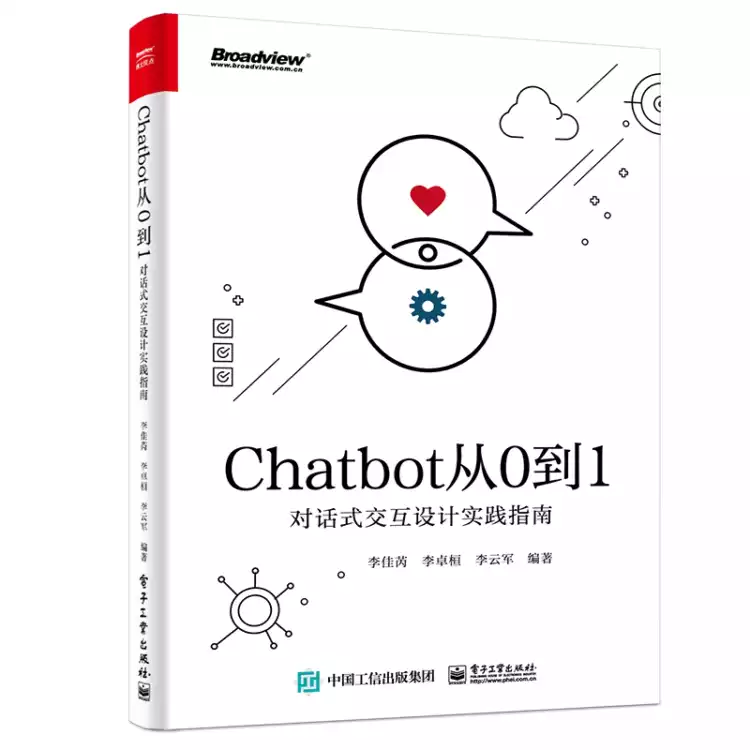 |
 |
| Author: Huan Li (李卓桓), Daozi (稻子)
| Editor: Zilin Yang (杨紫琳)
| Design: Yingjie Liu (刘颖洁)
Reprinted from: Kaiyuanshe (开源社) — https://mp.weixin.qq.com/s/JS-fzyFwWYnJ0_2_GBu6lw
Chinese version: 开源社:走进 “ SLASH(斜杠)青年 ” 李卓桓
